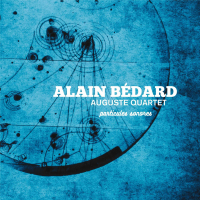Home » Jazz Articles » Album Review » Alan Shorter: Mephistopholes To Orgasm Revisited
Alan Shorter: Mephistopholes To Orgasm Revisited
Some responsibility for his obscurity lies with Alan Shorter himself. Known as Doc Strange to his teenage schoolmates in Newark, New Jersey, Shorter engaged with the music business strictly on his own terms, refusing ever to compromise. It was an unequal struggle, made the more so by the relatively challenging nature of his music. As a trumpeter and flugelhornist Shorter's technique was only so-so, and his improvising abrupt and micro-episodic. As a composer—and it was as a composer that Shorter shone most brightly—he was unsettling going on spooky. Indeed, some of his pieces make Bernard Herrmann sound like a composer of lullabyes.
A measure of Shorter's obscurity during his lifetime can be gauged from the amount of space given to him in The New Grove Dictionary Of Jazz, first published in 1988, the year Shorter passed, and then by far the most comprehensive one-stop compendium of jazz biography available. Almost alone among the thirteen musicians who are heard on Mephistopholes To Orgasm Revisited, Shorter has no entry in the 1,400 page large-format tome. Perhaps significantly, the only other musician heard on the album to be missing from Grove is another overshadowed sibling, drummer Muhammad Ali, who took over on one recording session after his brother Rashied Ali walked out following a row with producer Esmond Edwards.
When it came to talking about his music, Shorter was cooperative and fulsome on the infrequent occasions when he was interviewed. But his responses, enigmatic at best and incomprehensible at worst, tend to raise more questions than they do answers. (In a 1967 interview for Jazz Hot magazine, Shorter said: "Some of these things I say, I don't understand them myself, not completely. I don't know why I say this or that.") What little hard information about Shorter's life and career is known was brought together in 2020 by aficionado David Grundy in his essay "Why?" The Parabolic New Music of Alan Shorter. The piece can be found online, and it remains Shorter's most extensive biography.
Mephistopholes To Orgasm Revisited opens with "Mephistopholes," from Wayne Shorter's The All Seeing Eye (Blue Note, 1966). The 9:40 track was written (and presumably arranged) by Alan Shorter, who also plays on the album. The rest of Revisited is the complete Orgasm (Verve, 1969), one of only two albums Shorter released as a leader. He fronts a quintet featuring Gato Barbieri and either bass and drums team Reggie Johnson and Rashied Ali or Charlie Haden and Muhammad Ali. ("Rapids," on the YouTube video below, is one of the tracks). The album benefits, like all the releases on the ezzthetics label's Revisited series, from state-of-the-art sound restoration.
Track Listing
Mephistopheles; Parabola; Joseph; Straits Of Blagellan; Rapids; Outeroids; Orgasm.
Personnel
Alan Shorter
flugelhornWayne Shorter
saxophoneJames Spaulding
saxophone, altoFreddie Hubbard
trumpetGrachan Moncur III
tromboneHerbie Hancock
pianoRon Carter
bassJoe Chambers
drumsGato Barbieri
saxophoneCharlie Haden
bass, acousticReggie Johnson
bass, acousticMuhammad Ali
drumsRashied Ali
drumsAdditional Instrumentation
Alan Shorter: flugelhorn (1-4, 6, 7), trumpet and tambourine (5); Wayne Shorter: tenor saxophone (1); James Spaulding: alto saxophone (1); Freddie Hubbard: trumpet (1); Grachan Moncur III: trombone (1); Herbie Hancock: piano (1); Ron Carter: double bass (1); Joe Chambers: drums (1); Gato Barbieri: tenor saxophone (2-7); Charlie Haden: double bass (2, 7); Reggie Johnson: double bass (3-6); Muhammad Ali: drums (2, 7); Rashied Ali: drums (3-6).
Album information
Title: Mephistopholes To Orgasm Revisited | Year Released: 2024 | Record Label: Ezz-thetics
Tags
Comments
About Alan Shorter
Instrument: Flugelhorn
Related Articles | Concerts | Albums | Photos | Similar ToPREVIOUS / NEXT
Support All About Jazz
 All About Jazz has been a pillar of jazz since 1995, championing it as an art form and, more importantly, supporting the musicians who make it. Our enduring commitment has made "AAJ" one of the most culturally important websites of its kind, read by hundreds of thousands of fans, musicians and industry figures every month.
All About Jazz has been a pillar of jazz since 1995, championing it as an art form and, more importantly, supporting the musicians who make it. Our enduring commitment has made "AAJ" one of the most culturally important websites of its kind, read by hundreds of thousands of fans, musicians and industry figures every month.






































